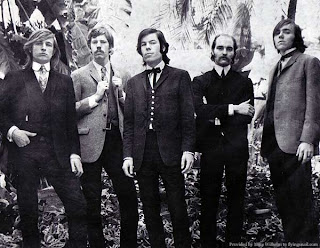
| Rola: | Alabama Bound |
|---|---|---|
| Intérprete: | The Charlatans | |
| Compositor: | Traditional, arreglado por The Charlatans | |
| Disco: | The Charlatans | |
| Productor: | Dan Healy, The Charlatans | |
|
|
|
"I'm Alabama Bound" is a ragtime melody composed by Robert Hoffman in 1909. Hoffman "respectfully" dedicated it to one M. T. Scarlata.[1] The cover of its first edition (published by Robert Ebberman, New Orleans, 1909) advertises the music as "Also Known As The Alabama Blues" which has led some to suspect it of being one of the first blues songs. However, as written, it is an up-tempo rag (Rag Time Two Step) with no associated lyrics. It has been recorded numerous times in different styles—both written and in sound recordings—with a number of different sets of lyrics. Two recording artists claimed composing credits for the tune under two different titles and both with differing lyrics: Trixie Smith for "Railroad Blues" (Paramount 12262, 1925) and Ferdinand "Jelly Roll" Morton for "Don't You Leave Me Here" (Bluebird 10450, 1939). Huddie "LeadBelly" Ledbetter recorded perhaps the best-known version of "I'm Alabama Bound" ("Alabama Bound", Victor 27268, 1940). |
|
|
|
| Duración: | 47:00 |
|---|---|---|
| Año: | 1969 | |
| Formato: | L.P. | |
| A la venta: | 01/10/1969 | |
| Disquera: | Phillips | |
|
|
|
Richard Olsen - Vocals, Bass, Woodwind instruments, Percussion Darrell DeVore – Vocals, Piano/Keyboards, Bass, Percussion Terry Wilson – Drums, Percussion |
|
|
|
|
|
|
|
Original
|
Traducción
|
|
Oh, don't you leave me here Oh, don't you leave me here But if you must go anyhow Just leave a dime for beer Oh don't you be like me Oh don't you be like me Drink your good sweet cherry wine And let that whiskey be I'm Alabama bound I'm Alabama bound And if the train don't stop and turn around I'm Alabama bound Well your hair don't curve And your eyes ain't blue Well if you don't want me, Polly Ann Well I don't want you |
|
|
|
|
The Charlatans is the self-titled debut album by the influential San Francisco psychedelic rock band The Charlatans and was released by Philips Records in 1969. The album was recorded at Pacific High Studios, San Francisco, with production and engineering by Dan Healy and The Charlatans. Although the record was The Charlatans' debut album, it was recorded and released relatively late in the band's career, a factor which contributed to its commercial failure. By 1969, the band's lineup had changed considerably from their 1965 – 1967 heyday, leaving Mike Wilhelm (lead guitar, vocals) and Richard Olsen (bass, vocals) as the only original members. Terry Wilson (drums) and Darrell DeVore (piano/keyboards, vocals) were recruited in order to flesh out the band, prior to the recording of the album. Unfortunately, The Charlatans was a critical and commercial flop upon its release. A contributing factor to the album's lack of success was the fact that The Charlatans' sound had become somewhat outdated by 1969, with their brand of jug band blues and gentle psychedelia being largely eschewed by the public in favor of a heavier rock sound. In his book, The Summer of Love: The Inside Story of LSD, Rock & Roll, Free Love and High Times in the Wild West, author Joel Selvin describes the album as "an unenthusiastic coda to a misspent career." Other reviewers have been kinder towards the album, with critic Bruce Eder, noting that the album "is a rather gorgeous and gently challenging piece of San Francisco rock, incorporating elements of blues and big-band swing, as well as '50s rock & roll and elegant '60s pop." A single taken from the album, coupling the Van Dyke Parks-penned song, "High Coin", with "When I Go Sailin' By", was released by Philips Records in 1969 but this too was met with commercial failure. Disillusioned by the album's lack of success, The Charlatans had broken up by the end of 1969. The Charlatans has been reissued on CD three times to date. Firstly, in 1992 by Eva Records as an unofficial (or bootleg) CD, where it was coupled with another unofficial Charlatans' album, a compilation of unreleased recordings titled Alabama Bound. The second reissue was on One Way Records in 1995 and included two bonus tracks, "The Shadow Knows" and "32-20", both of which had appeared on The Charlatans' debut single in 1966. The third reissue of the album was released under the title San Francisco 1969 by Acadia Records in 2004 and was digitally remastered from the original master tapes. The Acadia release also included a 1969 Philips Records' radio advertisement for the album as a bonus track. Of all the CD reissues, the Acadia release boasts by far the best sound quality. |



No hay comentarios:
Publicar un comentario
Nota: solo los miembros de este blog pueden publicar comentarios.